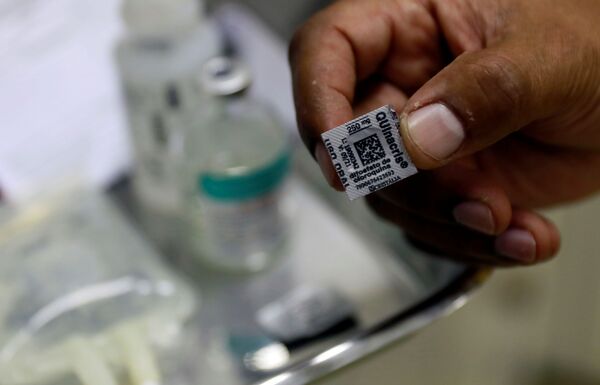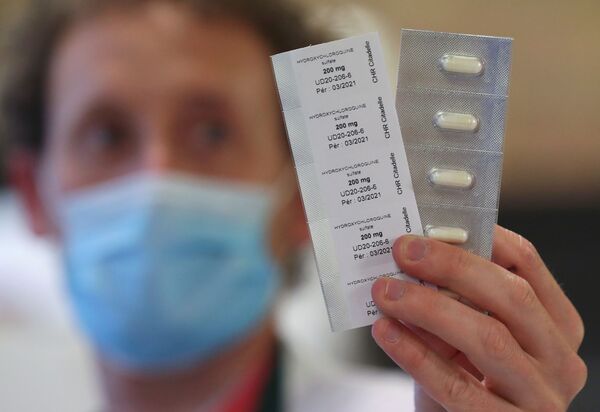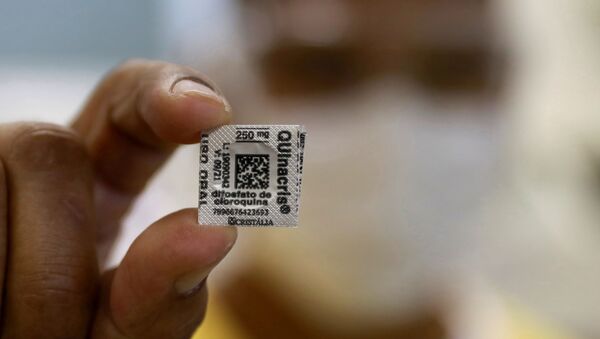US President Donald Trump cuased an uproar this week after claiming that he was taking the anti-malaria hydroxychloroquine (HCQ) drug as a preventive measure against COVID-19. Following his surprising revelation, a leading official from the World Health Organization (WHO), Dr. Michael Ryan, went on record to advise against the use of the drug outside of clinically accepted trials, citing potential “side effects”. This comes as some health authorities around the globe have launched trials to assess the drug’s effectiveness in preventing or at least mitigating the effects of the coronavirus.
American FDA Moderates Its Stance Towards HCQ
The drug has been approved for medical use in the US for the treatment of malaria, lupus and rheumatoid arthritis according to the Food and Drug Administration (FDA), and has been in use since 1955. Hydroxychloroquine is a prescription drug in the US, that can be bought under the brand-name Plaquenil, in the form of pills, and according to recent data, the prescription of this medication has soared since late March, after the FDA temporarily authorized “emergency use” of the medication for COVID-19 treatment in hospitals.

In the mid-April, FDA publicly warned about the dangers of using both hydroxychloroquine and chloroquine outside of a hospital setting, due to the risk of arrhythmia. However, after US President Donald Trump publicly asserteed that the drug's use to counter COVID-19 was a "game changer", the agency softened its stance, arguing that “the decision to take any drug is ultimately a decision between a patient and their doctor”, according to a statement by FDA Commissioner Dr. Stephen Hahn.
There are currently some 34 clinical trials ongoing in the United States that are testing HCQ’s effectiveness in the treatment or prevention of COVID-19.
UK Begins Trials For The Drug’s Effectiveness in COVID-19 Prevention
British health workers are taking part in the first global study to assess whether chloroquine or hydroxychloroquine could prevent the infection, among the NHS staff working with coronavirus-stricken patients. The trials will be led by the University of Oxford and the Wellcome Trust, with support from the Bangkok-based Mahidol Oxford Tropical Medicine Research Unit.
Hospitals in Thailand, Italy, Portugal, South America and Africa are also soon expected to join the trials, currently dubbed Copcov. Those health workers taking part in the study will either be prescribed HCQ or a placebo to measure its effectiveness. According to project leader Sir Nicholas White, however, the drug’s performance remains obscure.
“We really do not know if chloroquine or hydroxychloroquine are beneficial or harmful against COVID-19”, the professor told the media. “The best way to find out if they are effective in preventing COVID-19 is in a randomised clinical trial. That’s what Copcov is – and why we’re doing this study”.
France and India Okay Prescription of Anti-Malaria Drug For COVID-19
French authorities have permitted state doctors to prescribe chloroquine and hydroxychloroquine for patients with COVID-19, despite warnings from some EU regulators about the side effects of the drug, which include heart problems, blurring of vision, nausea and headaches. The French military reportedly bought a large amount of chloroquine-containing tablets from China in April, despite the controversy surrounding its use.

India’s health ministry has not only greenlit the use by doctors of HCQ to treat infections but also publicly endorsed the use and sale of the drug. Health authorities have recommended those citizens in contact with COVID-19 patients use the pills as a preventive measure, but only with a prescription from a doctor. It was reported in the end of April that India had shipped some 50 million HCQ-containing tablets to the US, but this information has not been confirmed by authorities.
Many Middle Eastern states, including Bahrain, have followed the lead and now prescribe the anti-malarial drug as a means of attempting to treat active coronavirus-cases or use as a preventive measure. The drug's effectiveness in these settings has not been proven.
Without proofs of the drugs' effectiveness, many states, including Germany, have steered away from their use in the fight against COVID-19, allowing pharmacies to only discharge the drug for the treatment of malaria, rheumatoid arthritis, idiopathic arthritis and lupus. In April, India said that Germany was among those nations that had received a significant shipment of HCQ.



